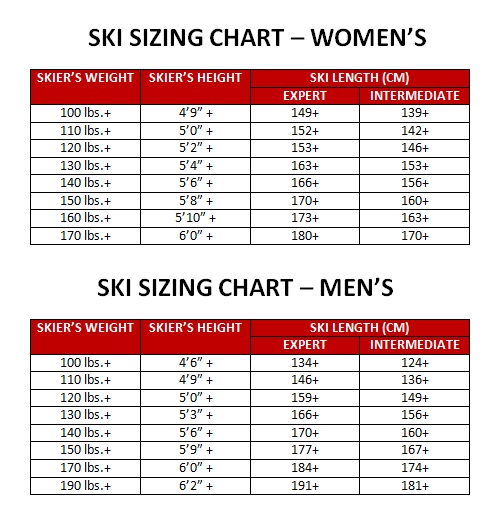Ski Size: Unlock Epic Powder Days with the Perfect Fit
Ever dream of gliding effortlessly through fresh powder, carving graceful turns down a groomer, or tackling challenging terrain with confidence? The secret to unlocking these exhilarating experiences lies, in part, with the right ski length. Choosing the appropriate ski size isn't just about looking good; it's about maximizing your performance, enhancing your control, and ultimately, having more fun on the mountain.
Selecting the perfect ski length is a bit like choosing the right bicycle. Too small, and you'll feel unstable and limited. Too large, and they'll become unwieldy and difficult to maneuver. The Goldilocks principle applies here – we're looking for the "just right" size that perfectly matches your individual needs and skiing aspirations.
While there's no one-size-fits-all answer to the question of "how big should my skis be?", there are some key factors to consider. These include your height, weight, skill level, and preferred skiing style. Historically, skis were much longer, prioritizing stability at high speeds. As ski technology and techniques evolved, skis became shorter and more shaped, allowing for quicker turns and greater maneuverability.
The importance of choosing the correct ski length cannot be overstated. The wrong size can lead to a frustrating experience on the slopes. Skis that are too long can be difficult to control, especially at slower speeds or in tight terrain. This can lead to fatigue and increase the risk of falls. Conversely, skis that are too short may feel unstable at higher speeds and won't provide enough float in powder.
So, how do you determine the ideal ski size? A good starting point is to look for skis that fall somewhere between your chin and forehead when stood on end. However, this is a very general guideline. Factors like your weight, skill level, and skiing style will fine-tune this recommendation.
For example, a beginner skier might prefer skis slightly shorter than chin height for easier turning. An advanced skier who enjoys carving high-speed turns on groomed runs might opt for skis closer to forehead height. Similarly, a heavier skier will generally benefit from slightly longer skis for added stability, while a lighter skier might prefer shorter skis for increased maneuverability.
Three key benefits of properly sized skis are improved control, enhanced performance, and increased enjoyment. With the right skis, you'll feel more confident and in control, allowing you to make smoother turns, navigate challenging terrain with ease, and ultimately, have more fun on the slopes.
To find your ideal ski length, consider using online ski size calculators, consulting with a ski shop expert, or demoing different ski lengths before making a purchase. Pay attention to how the skis feel and perform in different conditions.
Advantages and Disadvantages of Different Ski Lengths
| Ski Length | Advantages | Disadvantages |
|---|---|---|
| Shorter | Easier to turn, maneuverable in tight spaces, good for beginners | Less stable at high speeds, less float in powder |
| Longer | More stable at high speeds, better float in powder, good for advanced skiers | Harder to turn, less maneuverable in tight spaces |
Five best practices for selecting the right ski size include: considering your skill level, factoring in your weight, thinking about your preferred terrain, demoing different ski lengths, and consulting with a ski shop professional.
Five real-world examples of appropriate ski sizes for different skiers might include: a beginner skier (5'8", 150 lbs) using 160cm skis, an intermediate skier (5'10", 170 lbs) using 170cm skis, an advanced skier (6'0", 190 lbs) using 180cm skis, a powder skier (5'11", 180 lbs) using 185cm skis, and a park skier (5'6", 140 lbs) using 165cm skis. These are just examples, and individual preferences may vary.
Common challenges include feeling overwhelmed by the choices, uncertainty about personal skiing style, and difficulty interpreting sizing charts. Solutions involve seeking expert advice, demoing skis, and focusing on individual needs.
FAQs: What size skis do I need for my height? How do I choose skis for powder? What ski length is best for beginners? What are twin tip skis? What is the difference between all-mountain and carving skis? Do I need different skis for different snow conditions? How do I care for my skis? What are ski bindings?
General answers advise considering various factors beyond just height, seeking expert advice, and researching different ski types.
Tips and tricks: Rent skis before buying, consider used skis, learn basic ski maintenance.
Choosing the right ski length is a crucial step in maximizing your enjoyment on the slopes. By understanding the factors that influence ski size – your height, weight, skill level, and skiing style – and by utilizing resources like online calculators, ski shop experts, and demo programs, you can find the perfect skis to unlock your full potential on the mountain. Don't underestimate the impact of proper ski sizing. It can transform your skiing experience, leading to greater control, enhanced performance, and ultimately, more exhilarating days carving through pristine powder and cruising down groomed runs. Investing the time and effort to find the right fit will pay dividends in the long run, ensuring countless memorable adventures in the mountains. So, get out there, explore, and experience the thrill of skiing with the perfect pair of skis under your feet!
Finding comfort and strength exploring my father watches over me lyrics
Sherwin williams rochester your ultimate paint guide
Wichitas vibrant tattoo scene your guide to the best ink









_4.png?itok=4kJ8WPPs)


